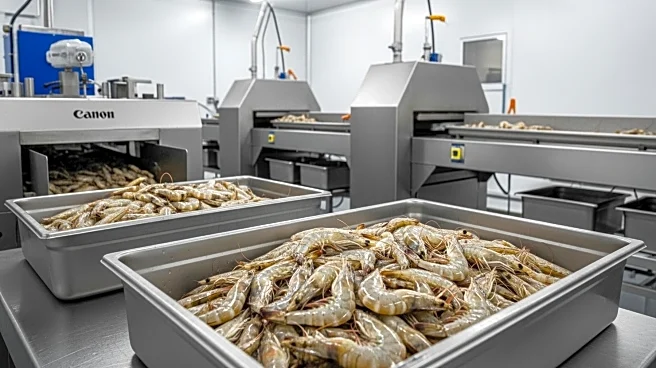What is the story about?
What's Happening?
Indonesia has introduced new export regulations requiring shrimp producers to certify their products are free of radioactive cesium before shipping to the United States. This follows a cesium contamination scare earlier this year, where U.S. inspectors found traces of the radioactive metal in shrimp shipments from PT Bahari Makmur Sejati (BMS Foods), affecting hundreds of thousands of pounds of product. The contamination was traced back to a now-closed steel mill, Peters Metal Technology, which processed scrap metal. Indonesian authorities have suspended imports of foreign scrap steel and iron pending stricter regulations, as they investigate the contamination source.
Why It's Important?
The cesium contamination incident underscores the importance of stringent safety standards in international trade, particularly for food products. The scare has prompted Indonesia to enhance its regulatory framework, which could impact trade relations and economic activities between Indonesia and the U.S. The situation highlights the potential health risks associated with radioactive contamination, even at trace levels, and the need for robust monitoring systems to protect consumers. The incident may also affect Indonesia's shrimp industry, a significant contributor to its economy, as producers adapt to new compliance requirements.
What's Next?
Indonesia's government is likely to continue its investigation into the contamination source, with potential legal actions against responsible parties. The new export certification process may lead to increased scrutiny and testing of shrimp products, potentially affecting export volumes and timelines. U.S. authorities may also review import protocols to prevent future incidents, possibly influencing bilateral trade policies. The situation may prompt other countries to reassess their import safety standards, particularly for food products.
Beyond the Headlines
The cesium scare raises broader concerns about environmental safety and the legacy of industrial activities. The contamination source, linked to scrap metal processing, highlights the need for sustainable practices and waste management in industries. The incident may lead to discussions on international cooperation for environmental protection and the regulation of hazardous materials. Long-term, the situation could influence global trade policies, emphasizing the importance of transparency and accountability in supply chains.


















